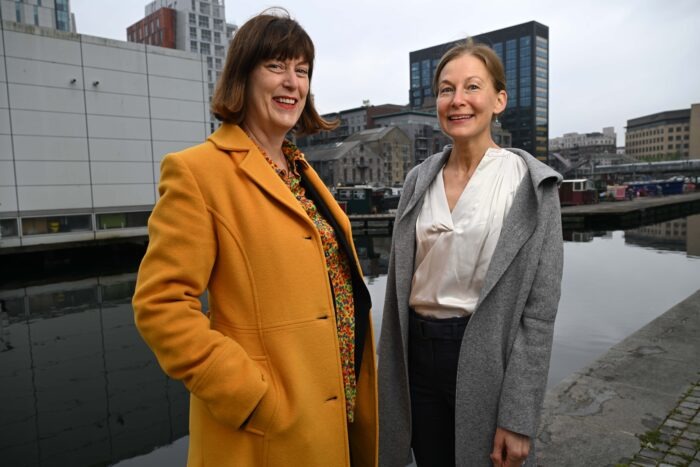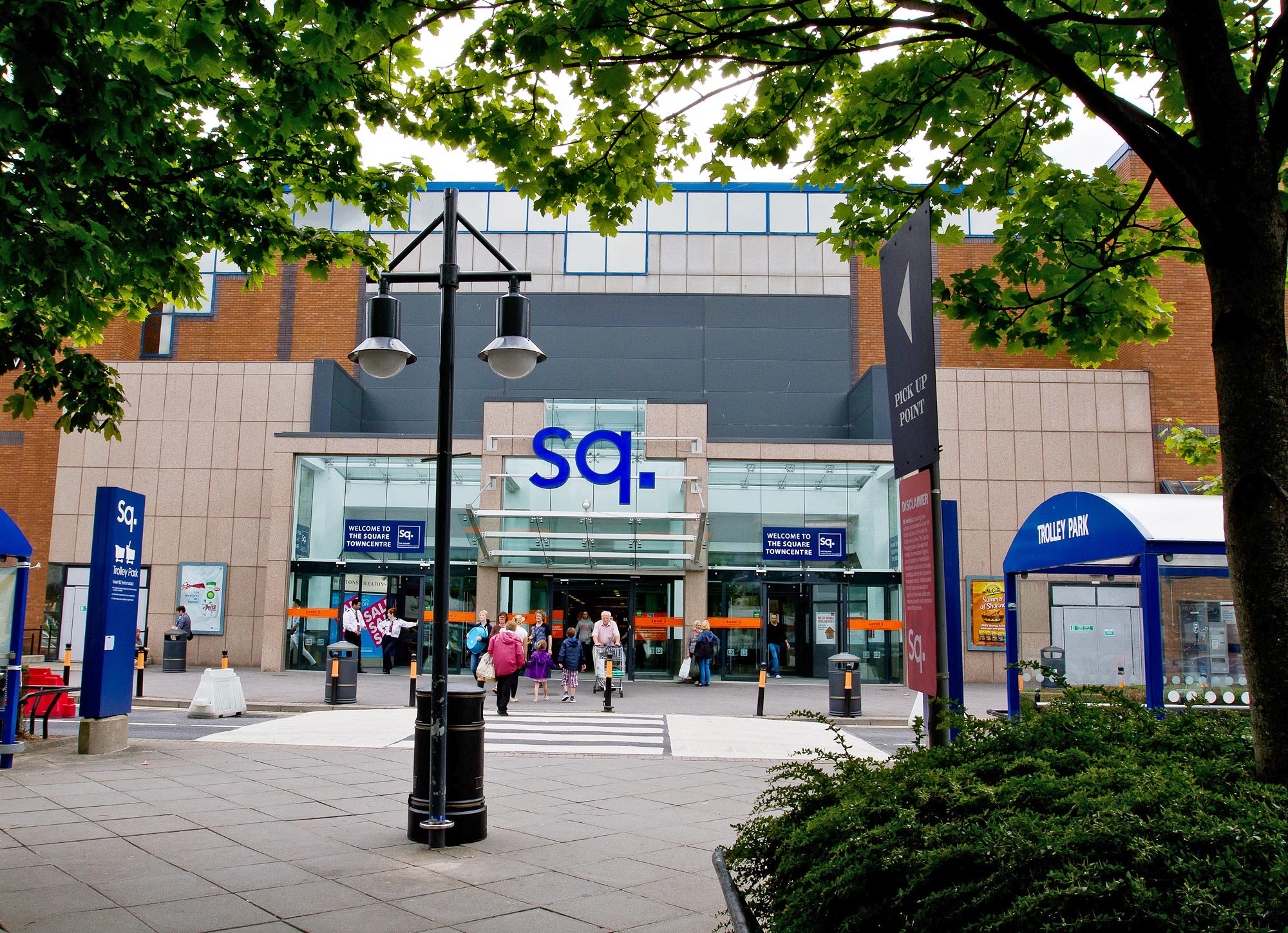Kieran Wallace and Eamonn Richardson know more than most about auctioning property assets.
As government-appointed liquidators to IBRC, they sold €25 billion of property and business loans through a series of rapid-fire portfolio sales. The sale is credited with putting a floor on the property market in Ireland, paving the way for a gradual recovery.
Now, Wallace and Richardson, formerly of KPMG but now with Interpath Advisory, are gearing up for another sale.
It is just one asset, but, just like the sale of the former Anglo Irish Bank and Irish Nationwide loan books, the sale of The Square shopping centre in Tallaght will serve as a bellwether for the strength, or weakness, of the commercial property sector.
Last week, AIB appointed the two accountants as joint receivers over the shopping centre. It was a consensual appointment; its owner Oaktree did not object, instead acquiescing to the foreclosure.
They will now manage an expedited sales process. Oaktree, a US investment firm with $192 billion in assets under management, will not get anything from the sale. AIB, owed €140 million by Oaktree on the shopping centre, might cover its exposure. But that is far from guaranteed.
The numbers tell their own story, highlighting the wider malaise in the commercial real estate market at present.
Oaktree paid €250 million to acquire the Tallaght shopping centre from Nama in 2019. In hindsight, we know this was the peak of the post-crash commercial property market.
By last year, the US investor was willing to sell the property for €170 million. However, no bid came near that figure. Instead, bidders were willing to stump up in the region of €125 million to €135 million. Oaktree might have settled for this in an effort to cut its losses, but one of its junior lenders was not and blocked a deal. This eventually triggered the receivership.
The receivership comes just months after Pimco, the US investment giant, appointed Richardson and Wallace as receivers to the buildings known as North Docks 1 and North Docks 2, two prime office developments also owned by Oaktree.
Is the receivership of The Square a canary in a coal mine? Or is it just an isolated issue?
Under stress
The commercial market is severely stressed. Still grappling with Covid and the changing nature of the workplace, it was also hit by inflationary pressures.
A recent Central Bank policy paper said that commercial real estate prices have now fallen more than 20 per cent in Ireland since the pandemic.
“While cyclical forces are contributing to price falls across the real estate market, structural changes to the use of office and retail space, driven by changing work and shopping patterns, are playing an outsized role in these two market segments,” according to the regulator.
The Central Bank added that “heightened uncertainty remains” and there was a possibility of “a continuation of recent price decreases”.
Recently analysis by the law firm Mason Hayes & Curran said that lenders are reporting sizeable movement of commercial real estate loans to stage two arrears. “This is defined under accounting standards as a significant increase in credit risk,” the firm said, although it did note that Irish banks’ commercial real estate exposures were now a much smaller portion of total lending than in the past – from 30 per cent before the crash to around 10 per cent now.
The risk has moved on to the funds that bought into Ireland’s recovery story, funds like Oaktree.
The distress is not unique to Ireland. Globally, commercial property investment is at an all-time low. As Mason Hayes & Curran put it, this is largely driven by the same factors of high interest rates and waning demand for office space.
According to the analysis from the blue-chip law fim, US-listed real estate prices decreased by 14 per cent, compared to 22 per cent in the UK for the same period and 13 per cent in Europe for the 12 months to the end of March 2023.
It said assets were being refinanced rather than repriced and sold, and that there was “a lack of willingness from sellers to accept low offers”.
It added: “As with the UK and US markets, there remains unrealistic pricing in the Irish CRE sector. There needs to be a cyclical pricing correction in weaker CRE assets to bring liquidity back to the market.”
A slowdown
Certainly, activity within the market has slowed down materially.
John McCartney, director and head of research with BNP Paribas Real Estate, tracks investment in Irish commercial real estate. In the first quarter of 2024, he said Ireland’s investment property market “limped out of the blocks” with just €160.5 million of income-producing assets changing hands in the first quarter of 2024.
This was the lowest total since Q3 2012. Furthermore, it was only 37 per cent of what was invested during the quietest quarter of the Covid pandemic (Q2 2020).
In his most recent update, McCartney said that “the sluggish velocity of trading reflects the fact that the price discovery process remains a work-in-progress”.
Facing higher interest rates and unresolved structural challenges, he said “many vendors have simply not softened their price expectations enough to make bid-ask spreads bridgeable”.
Interestingly, BNP found that retail enjoyed its strongest share of the action since 2016, with €69.06 million of retail assets traded in the quarter.
However, given the low overall turnover, it said the absolute value of trading in retail assets remained two-thirds below the 10-year quarterly average.
Retail values seem to be holding up better than office buildings, but they are still falling. According to the MSCI/SCSI Ireland Quarterly Property Index, retail property valuations fell by nearly 10 per cent last year.
Deal flow in the sector is falling also.
Cushman & Wakefield, the property specialists, said that, on average, investment volumes across the Irish retail property market hit a high of more than €6 billion in 2019.
On average, however, around €4 billion has been the norm. Last year, the figure collapsed to €2 billion, and Cushman & Wakefield is forecasting that it will increase to €2.5 billion this year as the market recovers.
At present, it seems many potential vendors are holding back, waiting for an uptick in prices before they commit to a sale rather than take the write-down in valuation. I know of multiple retailers that have made bids on vacant retail outlets, but were rebuffed because they were unwilling to meet the asking price. Some landlords are happier with a vacant lot than booking a write-down, and potentially, breaching covenants.
However, the “pretend and extend” tactics will only last for so long. The world has changed. The fundamentals of the market have changed.
The price that Wallace and Richardson achieve for The Square will set the new floor.
*****

Elsewhere last week, we reported on how Rethink Ireland has invested €109 million in 448 projects impacting more than one million people in Ireland. Its CEO Deirdre Mortell told Tom that it is only beginning while Helene Hugel explained how it gave Helium Arts the ability to help sick children nationally.
Alison caught up with Tom Keogh as part of Brand Matters, a podcast series supported by the law firm Whitney Moore. Keogh is a third-generation farmer. But the man behind Keogh’s Crisps also understands the value of brand more than most. In the interview, he revealed how it helped drive a 200-year-old family business in a new and innovative direction.
Founded in 1998, Keyword Studios, the gaming services business, has morphed into a behemoth employing over 12,000 people. Now Swedish private equity giant EQT is circling and more may come to play. Michael Cogley looked at the rise of Keywords Studios, the Dublin gaming company subject to a €2.5 billion takeover bid.
As Ireland recognises Palestine and Israel suspends diplomatic relations, records released to The Currency showed a sharp increase in the shipments of military-grade computer equipment exported to Israel with the Government’s green light. Niall had the detail.
Ireland is a global hub for aviation leasing and a world leader in financial securitisation. But just how much money are these IFSC sectors contributing to the State? We had the detail.


